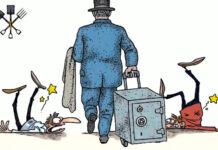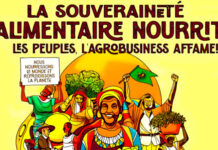While a controversy rages in the EU over European contributions provided to environmental associations that supported the strategies ‘Green Deal’ and ‘Farm to Fork’ China suspends imports of GMO soybeans due to excessive residues of pesticides, herbicides and other toxic chemicals.
The debate between the lobbies of the financial oligarchies that control the chemical industry and agribusiness, on the one hand, and the stakeholders who in the name of civil society promote the protection of public health and ecosystems, on the other, remains steeped in misinformation and demagogy.
1) European Union, funding for the LIFE programme
The controversy raised by the Dutch daily newspaper De Telegraaf stems from the fact that some environmental associations are among the tens of thousands of beneficiaries of the LIFE programme. And they have contributed to promoting European policies for the environment and climate, carried forward by the then Vice-President of the Commission Frans Timmermans at the beginning of the last legislature. (1)
The LIFE programme is the financing instrument created by the European Economic Community back in 1992 – and still ongoing – specifically to help implement, update and develop environmental policy and legislation in the EU. This program, in over thirty years, has co-financed public and private bodies in over 5,500 research and innovation projects for the monitoring and restoration of ecosystems and biodiversity. (2)
1.1) EU policies, public funding and transparency
The Common Agricultural Policy (CAP) still absorbs 31% of the EU budget. (3) And yet it is very difficult, as pointed out by the European Parliament itself in a specific study, (4) to trace the ultimate beneficiaries of the contributions granted by the EU and the Member States precisely within the Common Agricultural Policy. (5) And the disparity in favour of large companies is also well known, given that 20% of the beneficiaries receive 80% of the contributions. (6)
Research projects in environmental matters, from Horizon Europe to LIFE, are distinguished first of all by the small amount of funding, compared to both the Common Agricultural Policy and aid (including military aid) to Ukraine. But above all by transparency, since in these projects the reporting is extremely rigorous and is made directly to the European Commission (or to the body delegated by it in the context of the relative programme). (7)
1.2) Conflicts of interest?
The debate on hypothetical ‘conflicts of interest’ reported by De Telegraaf stems from statements by Bavarian MEP Monika Hohlmeier (European People’s Party, EPP). She said she would propose to the Strasbourg Assembly to exclude non-profit associations from access to the LIFE programme. After noting that EEB (European Environmental Bureau) – an organisation representing 185 civil society organisations, with over 2 million members – received €770,000 in a LIFE project that included drafting ‘policy briefs’ and sharing them with members of the European Parliament.
The Bavarian MEP denounces the use of ‘public money for environmental lobbying and advocacy’. Coincidence, just on the eve of the elections in Germany where the great success of the far-right party AfD is expected. But the same Monika Hohlmeier, as Corporate Europe Observatory denounces, receives €75.000/year from BayWa. A company that claims to be the largest trader of agricultural products in Germany, and which has in turn received €6,5 million through the LIFE program and carried out lobbying activities in the European Parliament. (8) The conflicts of interest of the complainant therefore appear to be much more serious than in the EEB ‘case’.
1.3) Industrial lobbies and civil society
Finance and industry, according to data collected by the European Commission, have invested a total of € 1,3 billion in lobbying activities. With important results, for the interests of the industries represented, with a significant impact on public health and ecosystems. Suffice it to remember:
– the boycott of the reform of the REACH (Registration, Evaluation and Authorization of Chemicals), and of the restrictions on the use of PFAS; (9)
– the nullification of the ‘Nature Restoration Law’, aimed at restoring ecosystems that are in a state of serious degradation in 70-80% of the territories; (10)
– the sinking of the SUR (Sustainable Use and Reduction of Pesticides Regulation) proposal, which envisaged the replacement of the most toxic chemical substances in agriculture (11,12).
The major European environmental organizations have a total budget of €45 million, of which only a small part is dedicated to lobbying activities. It is therefore no coincidence that the European Citizens’ Initiatives themselves – #SavetheBees and the Farmers, above all (13) – have remained unheard.
2) China, stop pesticide-laden GMO soybeans
An ancient Chinese proverb indicates that governance is based on life, and life is based on adequacy. This can explain why the General Administration of Customs of China, on January 8, 2025, decided to suspend imports of the indispensable soybeans from Brazil – the world’s leading producer, whose main buyer is the PRC – because they do not meet food safety and environmental protection requirements. (14)
The above-mentioned measures affected ships loaded with GMO soybeans coated with pesticides, from Cargill Agrícola SA, ADM do Brasil, Terra Roxa Comércio de Cereais, Olam Brasil and C.Vale. The decision – according to Diana Chaib, economist and researcher on Sino-Brazilian relations at the Federal University of Minas Gerais (UFMG), interviewed by Brasil de Fato (14) – can be understood as ‘a warning to the Brazilian agribusiness, in particular on the need to improve quality controls and review practices related to the use of pesticides’.
3) Food safety, environmental standards and agricultural production
‘The maintenance and the expansion of the market and trade in China’ – which represents over 60% of global soybean trade – ‘depend on strict compliance with required health and environmental standards, and this could lead to the need for significant changes in Brazilian agricultural practices’ reiterates Diana Chaib.
The intensive use of pesticides, herbicides and other pesticides in fact cause damage to agricultural production, as well as to public health and the environment. The researcher of the Osvaldo Cruz Foundation (Fiocruz) Karen Friedrich, interviewed by Brasil de Fato, clarifies that such abuse ‘is causing the emergence of new pests, because pests become resistant to pesticides’.
‘It’s the same logic of hospital antibiotics’, continues the researcher. ‘Through indiscriminate use, these substances have caused the development of super-resistant bacteria. And in agriculture, there are parasites that develop resistance’. (14)
4) Rhetoric and disinformation
The large agricultural confederations took the opportunity of a false scandal to resume the battle against the ‘Green Deal’ and the ‘Farm to Fork’ strategy, which is one of its ten points. Confusing objectives that are unsustainable from an economic point of view – such as the transition from internal combustion engines to electric ones for agricultural machinery – and objectives that must be achieved, to safeguard public health and ecosystems.
This rhetoric is functional only to the interests of the financial oligarchies that control the global pesticide and seed markets. Which, over the decades, have increased their profits disproportionately, concentrated monopolies and aggravated farmers’ dependence on their products. 94,8% of agricultural businesses in the EU are family-run and peasant-run and are still at risk of survival, after 37% of them have already closed between 2005 and 2020 due to lack of income and not lack of pesticides. (15)
5) Provisional conclusions
Farmers need a #fairprice for their food, as well as direct aid to diversify crops and move towards agroecology. In a logic of sustainable development and efficiency of nutrient cycles. (16) And it is essential to put an end to pollution from PFAS and microplastics – still used in the production of pesticides (9,17) – which irremediably poison soil and water with serious effects (17,18).
Research and innovation must receive more funds to be allocated to the agri-food chain and to environmental protection, rather than to the war industry (which is also controlled by the same financial oligarchies that dominate the agrochemical industry. See note 19). Public and private research institutions, small and medium-sized enterprises, non-profit organizations must participate in these projects also and precisely in that logic of governance that, according to the Chinese proverb, must be based on life and adequacy.
#Égalité
Dario Dongo
Credit cover Brasil de Fato (See note 14)
Footnotes
(1) Alexander Bakker. Lobbyschandaal in Brussel: EU betaalde milieuclubs in het geheim voor promotie van groene plannen Timmermans. The Telegraph. 22.1.25 https://tinyurl.com/535ncb3j
(2) LIFE programme. European Commission, European Climate, Infrastructure and Environment Executive Agency https://tinyurl.com/mrju429r
(3) Special report 20/2024: Common Agricultural Policy Plans – Greener, but not matching the EU’s ambitions for the climate and the environment. European Court of Auditors. 30.9.24 https://tinyurl.com/274cu4aa
(4) The Largest 50 Beneficiaries in each EU Member State of CAP and Cohesion Funds. Study (2021). European Parliamenthttps://tinyurl.com/ybjk44ut
(5) Ajit Niranjan. Revealed: billionaires are ‘ultimate beneficiaries’ linked to €3bn of EU agriculture subsidies. The Guardian. 3.11.24 https://tinyurl.com/mdyuk6cu
(6) CAP performance: 2014-20. European Commission, Agriculture and Rural Development https://tinyurl.com/nhfkphw6
(7) See for example LIFE reporting. European Commission, European Climate, Infrastructure and Environment Executive Agency https://tinyurl.com/5n985xru
(8) Conflict of Interest Exposed in Conservative Push to Defund NGOs. Corporate Europe Observatory. 22.1.25 https://tinyurl.com/u4zn9mk9
(9) Dario Dongo. Dossier – PFAS, industrial lobbies and politics against public health. Petition. GIFT (Great Italian Food Trade).
(10) Dario Dongo, Alessandra Mei. ‘Nature Restoration Law’, green light with downward agreement. FT (FoodTimes). November 14, 2023
(11) Dario Dongo. Protesting farmers, pesticides instead of #fairprice. FT (FoodTimes). February 7, 2024
(12) Marta Strinati, Dario Dongo. Reducing toxic pesticides is a priority for EU citizens. A petition. FT (FoodTimes). November 17, 2024
(13) Dario Dongo. #SaveTheBees, civil society calls for true pesticide-free ecological transition in EU. FT (FoodTimes). June 17, 2022
(14) Leonardo Fernandes. China halts soy imports from Brazilian companies over pesticide contamination. Brazil of Fact. 23.1.25 https://tinyurl.com/ppky3ak3
(15) Dario Dongo. The tentacles of finance on food sovereignty and our food. GIFT (Great Italian Food Trade).
(16) Dario Dongo, Jacopo Govi. Agroecology, the how and why. GIFT (Great Italian Food Trade).
(17) Marta Strinati. Microplastics in pesticides, the CIEL report. FT (FoodTimes). July 20, 2022
(18) Dario Dongo, Andrea Adelmo Della Penna. Special – microplastics in the human body, scientific review. FT (FoodTimes). January 18, 2025
(19) Dario Dongo. The warlords in the European elections. Égalité. 2.4.24
Dario Dongo, lawyer and journalist, PhD in international food law, founder of WIISE (FARE - GIFT - Food Times) and Égalité.








